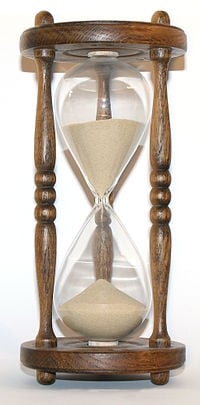You have /5 articles left.
Sign up for a free account or log in.

Wikipedia
If grad students could eke an extra hour out of the day, many valuable things could be accomplished -- sleep would probably top the list for most. But job searching might find its way into some of those precious extra minutes. Most grad students and postdocs are great at juggling a myriad of responsibilities and commitments, but when it’s time to focus on a job search, the added stress of new tasks and unknown variables can seem overwhelming. Timing may not be everything in a Ph.D. job search, but understanding aspects of time and timing will make the job search just a little bit easier.
Job searches are postponed or ignored for many reasons: a feeling that other priorities are more important, a lack of understanding of the best ways to use time or just plain wasted time (if you’ve spent hours retyping your résumé information into an online HR portal you know exactly what I’m talking about).
However, like any big long-term project, knowing what you’re getting into before you begin will make life easier. Would you start out on a trip without a map or a sense of how long the journey might take? It might have been fun as a road-tripping undergrad, but the capricious approach doesn’t usually get Ph.D.s to the right place at the right time.
Know that it takes time to find any job. Then add more time to that for a Ph.D. job. Jobs at an appropriate level for Ph.D.s aren’t widely advertised and won’t be available where you want when you want. Adjust your expectations and prepare for a marathon instead of a sprint. Or as my colleague Chris Taylor at M.D. Anderson Cancer Center puts it: don’t expect the timing of a microwave meal when you’re cooking in a Crock-Pot.
An oft-quoted urban myth says that job seeking takes a month for every $10,000 of salary you seek, thus a $90,000-annual-salary position would take nine months to find. This is totally unsubstantiated, but it makes sense when considering the time and effort to find types of jobs appropriate for your education and expertise. The average time an American spends unemployed is nine months, according to the Bureau of Labor Statistics. If you are focused on a particular industry, company or geographic location, your opportunities may be even more elusive and thus your time to find a job might take even longer than expected. Remember: marathon, not sprint. Bring some snacks.
For the overall timing of your job search, 18 months is ideal, giving you the luxury of time to explore options, understand what titles and job responsibilities are, talk to people in those jobs, see how your own strengths and priorities match up to those roles, and then create or refine your application materials. But that’s not Ph.D. reality. Attempting to research careers and submit applications while finishing up a thesis or project with vague completion dates that can range from two months to a year is maddening and has led many a Ph.D. to act like an ostrich and ignore the whole thing. Just jump in. I encourage grad students and postdocs to create lunchtime lists of websites to peruse or small tasks to accomplish in 5 to 15 minutes, which can allay the sense that there’s so much to do in the job search and so little time. You’re a researcher -- so you know that garnering more knowledge gives you more options, which leads to more potential opportunities.
Also consider the timing of different hiring cultures and practices. Academic hiring cycles are already known to you. Even so, be aware that certain disciplines hire only at annual meetings, or will list positions in particular publications or Listservs. Don’t ever assume "it’s a slow time" or "I’m off cycle," because even the most well-established hiring schedules have an occasional blip. Keep an eye out well before you are actually job seeking to get a sense of the timing in that field and for any unusual patterns in the timing of postings (see where that ideal 18 months comes in handy?).
The timing of hiring into nonacademic roles will of course be dependent on the industry or organization, but job posting and hiring for most jobs beyond academia is usually immediate. And some Ph.D. jobs literally are only available once a year. This is a constant dilemma for the Ph.D. job seeker.
Life sciences postdoc Michelle started her beyond-the-bench career path exploration in August, about a year before her lab project would (hopefully) finish. Success -- she almost immediately found an opening for a dream job. But from her research (informal conversations with people in that industry and also in that specific company) she knew this type of role was a rarity. So she interviewed in December, even knowing she really would not have been able to leave her laboratory and finish her Ph.D. until late spring at the earliest. Luckily, the hiring manager (also a Ph.D.) was kind and had a frank conversation with Michelle, encouraging her to "have a think" before moving to the next stage of interview.
Ultimately Michelle declined going farther in the interview process, but kept a positive professional relationship with that company and -- surprise -- another, similar position has recently opened up, which of course the hiring manager contacted her about before it was publicly posted. This type of timing quandary is unavoidable in a Ph.D. job search. Don’t apply for things you can’t really accept, which could burn bridges for you in a target organization -- but also don’t miss out on chances for jobs that might only come open once in a blue moon.








